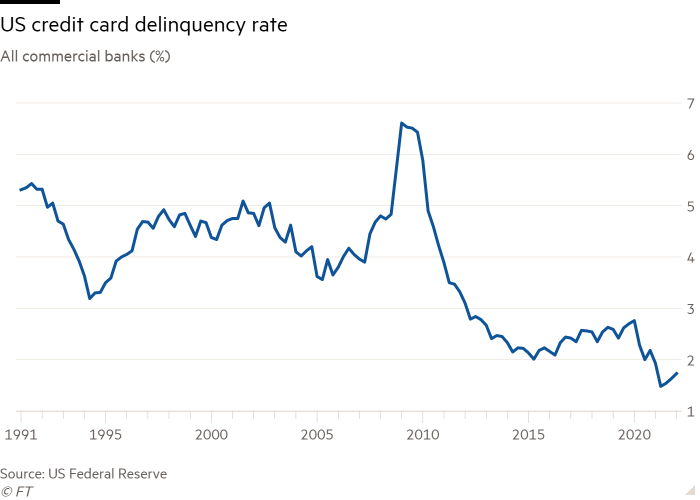[ad_1]
This article is an on-site version of The Lex Newsletter. Sign up here to get the complete newsletter sent straight to your inbox every Wednesday and Friday
Dear reader,
The drumbeat of recession is getting louder. Stocks are falling. Bond yields are surging. Jitters over inflation and rate rises boiled over and pushed the S&P 500 into bear market territory this week. Almost 70 per cent of leading academic economists polled by the Financial Times believe the US economy will go into reverse next year.
Yet pessimism about the economy has not kept Americans from reaching for their credit and debit cards. For all the recession talk, the US labour market remains on a solid footing. An unemployment rate of 3.6 per cent hovers near historic lows. Consumers as a whole are showing surprising resilience.
Consumer spending, which accounts for more than two-thirds of US economic activity, increased 0.9 per cent in April, according to the latest data from the commerce department.
More recent reports on credit card usage suggest the trend is holding up. At Bank of America, total credit and debit card spending was up 9 per cent year on year in May, while total transaction volume grew 7 per cent.
Data from the Federal Reserve Bank of St Louis showed overall consumer revolving debt — which is mostly based on credit card balances — stood at $869bn as of June 1. That is 9 per cent higher compared with the start of the year and surpasses the pre-pandemic peak.

All that spending is evident in New York City. People are still queueing for iced lattes outside hipster coffee shops, despite prices now pushing towards $7 a cup. At the Vietnamese restaurant that I frequent, tables remain hard to come by, even though prices on most menu items have gone up by about a third this year.
After two years of pandemic-related restrictions, Americans are keen to be out and about again. And they are more than willing to splurge for the experience. The two biggest online travel sites, Booking Holdings and Expedia, have predicted this could be their busiest summer travel season ever — higher airfare and hotel rates be damned!
United Airlines said it had seen a surge in international travel searches after the US this week stopped requiring international passengers to provide proof of a negative Covid-19 test to enter the country.
But Americans’ eagerness to live large may not tell the entire story. Higher consumer spending is also being driven by higher prices at the pump and for everyday goods. Average gas prices have climbed almost two-thirds over the past 12 months to top $5 a gallon. Even if people are buying the same amount of food and fuel, consumer spending will rise simply because prices are higher.
Consumer spending figures may therefore understate the impact of spiralling living costs, particularly on lower-income households. These are the first to be affected by a slowdown in the economy. Higher credit card debt points to financial desperation as well as well-off Americans having fun.
For now, inflation doesn’t seem to be straining the budgets of average families. Although delinquency for credit card loans is creeping up again, they remain low by historical standards.

For credit card companies, making money won’t be easy. One consequence of the resurgence in card spending is increased competition. Card issuers are stepping up their fight for new customers by offering more rewards and loosening lending standards.
That may explain why shares in standalone card companies such as Synchrony, Capital One Financial, Discover Financial Services and American Express are down 13 to 37 per cent this year.
The adjustment to higher rates and weaker growth will be painful and lengthy. Anecdotally, credit is already becoming much less available. The story told by credit card balances is more complex and less positive than the bald numbers at first suggest.
Enjoy the rest of your week
Pan Kwan Yuk
Lex writer
If you would like to receive regular updates whenever we publish Lex, do add us to your FT Digest, and you will get an instant email alert every time we publish. You can also see every Lex column via the webpage
[ad_2]
Source link

